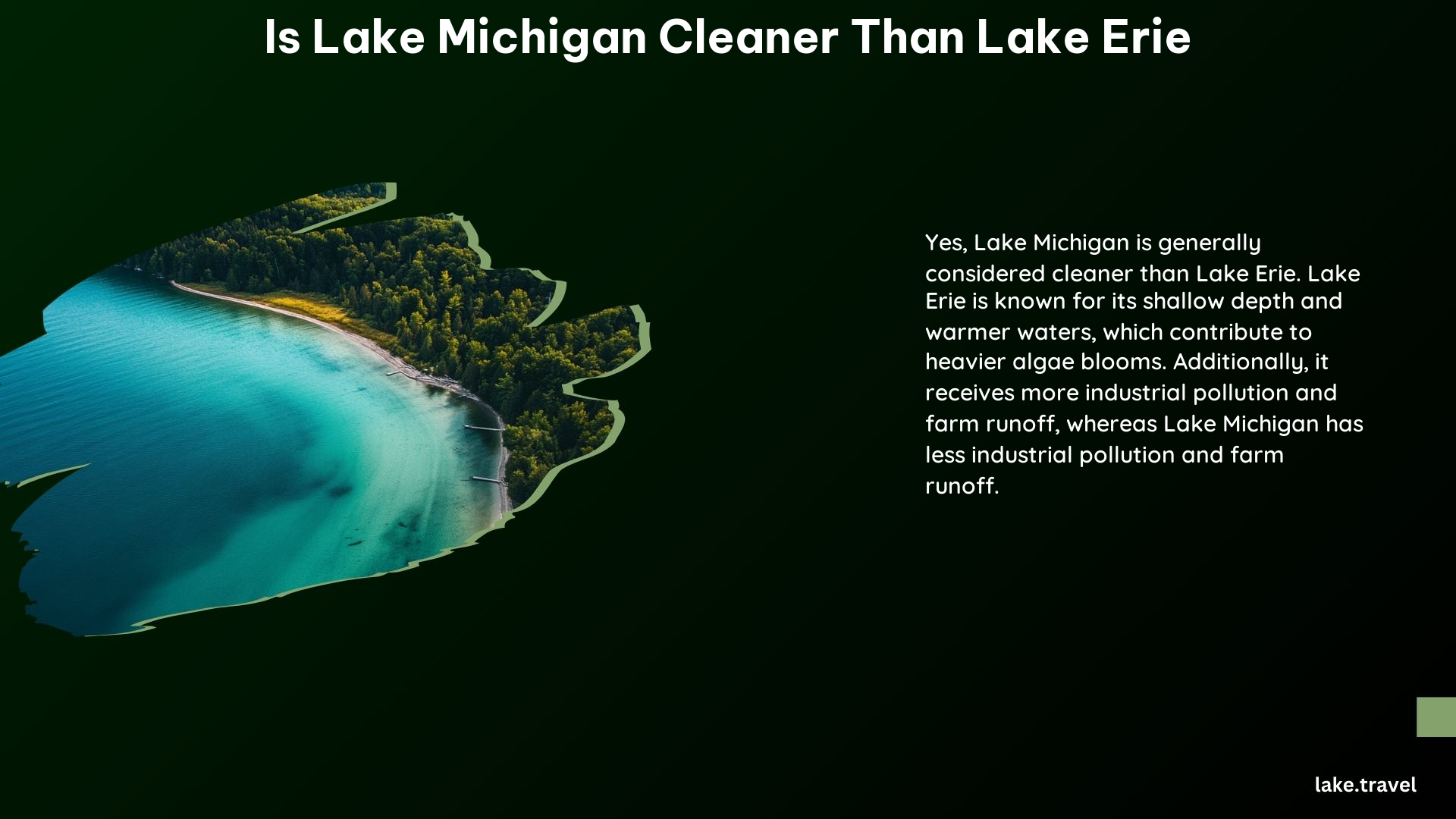Yes, Lake Michigan is generally considered cleaner than Lake Erie. This can be attributed to several key factors that contribute to the difference in water quality between the two Great Lakes.
Depth and Temperature Differences

One of the primary reasons for Lake Michigan’s cleaner water is its depth and temperature profile. Lake Michigan is significantly deeper than Lake Erie, with an average depth of 85 meters (279 feet) compared to Lake Erie’s average depth of just 19 meters (62 feet). This deeper depth and colder water temperature in Lake Michigan help reduce the likelihood of heavy algae blooms, which are more common in the shallower and warmer Lake Erie.
Industrial Pollution and Runoff

Another factor that contributes to Lake Michigan’s cleaner water is the lower level of industrial pollution and farm runoff compared to Lake Erie. Lake Erie, due to its proximity to major industrial cities like Detroit and Cleveland, has historically been more susceptible to receiving waste and chemicals from these sources. This has led to a higher pollution load in Lake Erie, which can negatively impact water quality.
Phosphorus Levels
Phosphorus levels are also a significant factor in the water quality difference between the two lakes. Lake Erie has higher phosphorus levels due to agricultural runoff, sewage treatment, and industrial processes. Excessive phosphorus can lead to over-enrichment with algae and aquatic weeds, depleting dissolved oxygen and harming aquatic life. In contrast, Lake Michigan’s phosphorus levels are generally lower, contributing to its cleaner water.
Water Quality Indicators
Research conducted on the Great Lakes provides various water quality indicators that help assess the overall health of these water bodies. These indicators suggest that Lake Michigan’s water quality is generally better than Lake Erie’s, with fewer instances of dissolved oxygen depletion and beach closings due to bacterial contamination.
Historical Pollution
Lake Erie has a history of being more polluted compared to Lake Michigan. This is largely due to its location, which has made it a recipient of waste and chemicals from the industrial cities along its shores. This historical pollution has led to a more degraded ecosystem in Lake Erie, with a higher risk of pollution-related issues.
Ecosystem Health
The cleaner water in Lake Michigan contributes to a healthier ecosystem overall. With lower levels of pollution and algae blooms, the lake’s aquatic life is better able to thrive, supporting a more diverse and balanced food web. In contrast, the degraded water quality in Lake Erie has had a more significant impact on its ecosystem, leading to challenges for various species.
Sustainable Solutions
The differences in water quality between Lake Michigan and Lake Erie have prompted researchers and policymakers to develop sustainable solutions to address the issues facing the Great Lakes. By understanding the factors that contribute to the cleaner water in Lake Michigan, these solutions can be tailored to address the specific challenges faced by Lake Erie and other water bodies.
In conclusion, Lake Michigan is generally considered cleaner than Lake Erie due to a combination of factors, including depth and temperature, industrial pollution, phosphorus levels, and historical pollution. These differences have led to better water quality indicators and a healthier ecosystem in Lake Michigan compared to Lake Erie. Continued research and the implementation of sustainable solutions will be crucial in maintaining the cleanliness of these valuable water resources.
References:
– Only 2 of the 5 Great Lakes have good ecosystems according to new report
– Why is Lake Michigan so much nicer than Lake Erie? – Reddit
– Water Quality in the Great Lakes | US EPA
